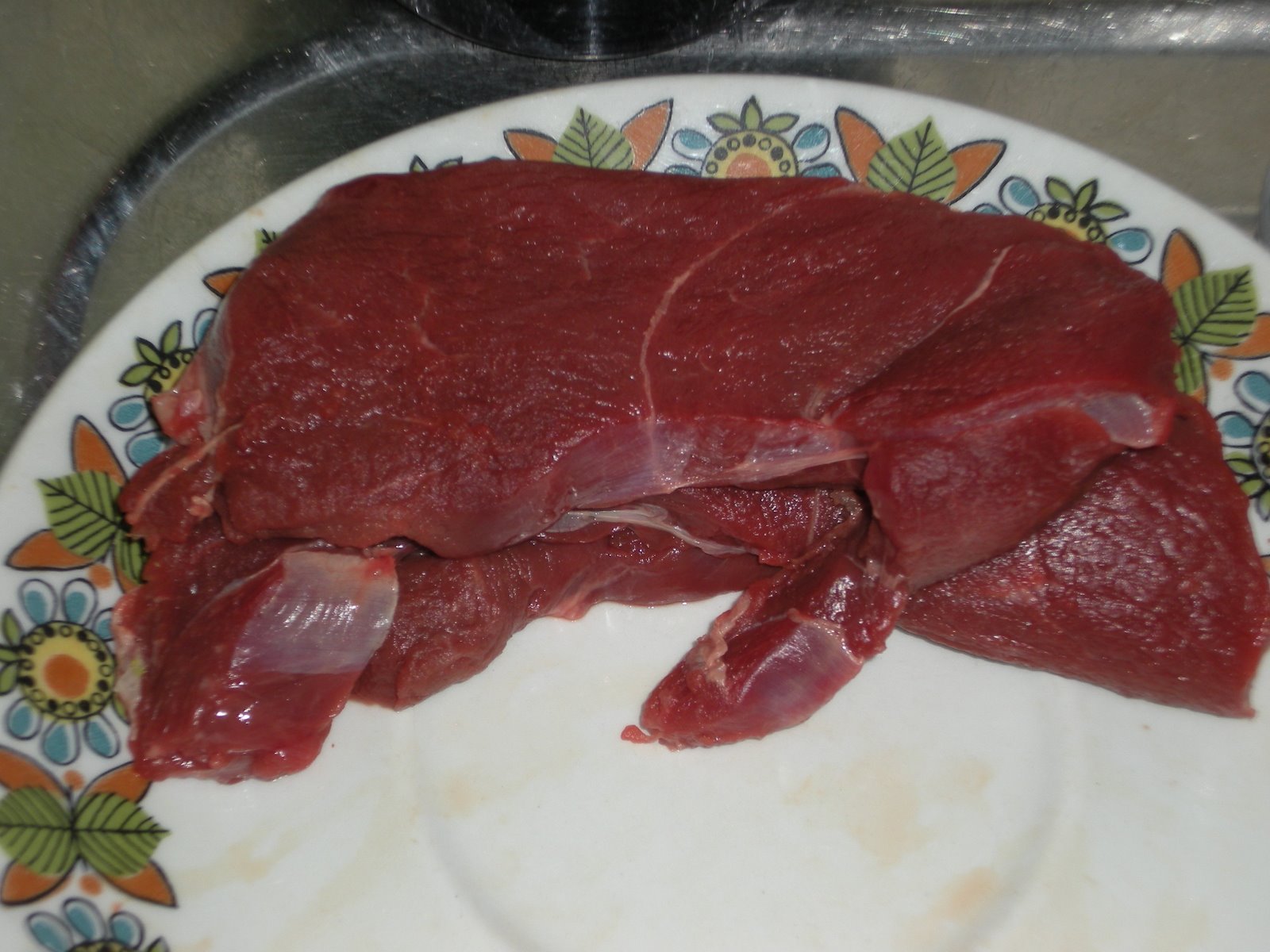
Venison
Venison originally meant the meat of a game animal but now refers primarily to the meat of deer (or antelope in South Africa).[1] Venison can be used to refer to any part of the animal, so long as it is edible, including the internal organs. Venison, much like beef or pork, is categorized into specific cuts, including roast, sirloin, and ribs.
For other uses, see Venison (disambiguation).Definition[edit]
Venison originally described meat of any game animal killed by hunting[3] and was applied to any animal from the families Cervidae (true deer), Leporidae (rabbits and hares), Suidae (wild boar) and certain species of the genus Capra (goats and ibex).
In Southern Africa, the word venison refers to the meat of antelope,[4] a Bovidae taxon, as there are no native Cervidae in sub-Saharan Africa.
Health concerns[edit]
Since it is unknown whether chronic wasting disease (CWD), a transmissible spongiform encephalopathy among deer (similar to mad cow disease, scientifically known as bovine spongiform encephalopathy), can pass from deer to humans through the consumption of venison, there have been some fears of dangerous contamination of the food supply from wild deer carrying CWD.[12] The disease has been found among farmed deer in the US and western Canada, but New Zealand has not identified the disease among its herd.
The Toxoplasma gondii parasite can also be transmitted through human consumption of undercooked or raw venison if it did not reach an internal temperature of 145 °F (63 °C) for whole pieces of meat, or 165 °F (74 °C) for ground venison. The CDC says 145 °F (63 °C) for whole cuts or steaks (medium well) or 160 °F (71 °C) for ground meat (well done). The CDC also says that freezing meat for several days in sub-zero (0 °F or −18 °C) temperatures can greatly reduce the chances of infection by the single-celled toxoplasmosis parasite.
Deer farmers have had tests developed especially for the particular species they raise to obtain better results than those used on cattle. Hunters are advised not to shoot a deer that appears sick or is acting strangely, and they are also advised to take general precautions in examining the meat from deer they have killed.[13]
Availability[edit]
Czech Republic[edit]
Venison (as well as other game meats, mainly wild boar) is a part of traditional cuisine and is commonly eaten, not considered a specialty. Dishes such as deer goulash are often on restaurant menus.[14] A variety of venison (roe, red and fallow deer, mouflon) and other game meat is widely available in butcher shops in fresh state, distributed by wholesalers,[15] as well as in big retail chains such as Tesco, at prices similar to beef or pork, around 200 CZK or 8 EUR per kilogram. Despite the popularity and low prices, in recent years the production of venison has surpassed demand, and is therefore often used in production of animal food.[16]
New Zealand[edit]
New Zealand has large populations of wild and farmed deer, making venison a relatively common meat. It is widely available in supermarkets.
United Kingdom[edit]
In England, hunting rights were restricted in an effort to preserve property rights. As a result, the possession and sale of venison was tightly regulated under English law,[17] although it is readily available commercially.
United States[edit]
In the United States, venison is less common at retail due to the requirement that the animal first be inspected by USDA inspectors. There are very few abattoirs which process deer in North America, and most of this venison is destined for restaurants. Where deer are considered an invasive species, companies such as Molokai Wildlife Management and Maui Nui Venison that hunt axis deer in Hawaii, combine culling with USDA certification and retail sale.[18][19] Most venison sold through retail in the United States are farmed from New Zealand and Tasmania. It is available through some high-end specialty grocers and some chains which focus on more "natural" meats. Non-retail venison is often obtained through hunting and self-processing or contracting to small meat processing facilities to do the processing for the hunter, but sale of the finished meat is usually illegal.[20]
The American sandwich chain Arby's gained attention in October 2016 when word leaked through social media that they were about to test a venison sandwich. Arby's later confirmed that they had selected 17 stores in Georgia, Michigan, Minnesota, Pennsylvania, Tennessee, and Wisconsin (all major deer hunting states) to offer a venison sandwich during a four-day test during those states' hunting seasons. Both due to curiosity and heavy demand from hunters, the sandwiches sold out in all markets on the first day of the test.[21]